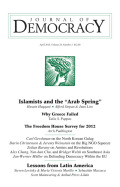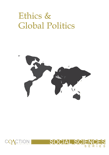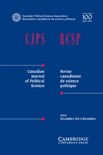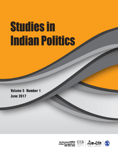
Torres de Lucca-Revista Internacional de Filosofia Politica
Scope & Guideline
Connecting Scholars Through Open Access Philosophy
Introduction
Aims and Scopes
- Deliberative Democracy:
The journal emphasizes the principles and practices of deliberative democracy, exploring how public deliberation can enhance citizen engagement and improve democratic processes. - Political Philosophy and Ethics:
A core area of focus is the exploration of political philosophy, including discussions on justice, rights, and ethical considerations in political contexts, aiming to understand and critique existing political structures. - Social Movements and Participation:
The journal addresses the dynamics of social movements, examining how various groups mobilize for rights and representation, and the implications of these movements for democratic theory and practice. - Critical Theory and Political Economy:
It engages with critical theories, particularly those that interrogate capitalism and its impact on democracy and social justice, providing a platform for rethinking economic structures in relation to political practices. - Child and Youth Participation:
There is a notable emphasis on the involvement of children and young people in political processes, investigating their rights and roles within deliberative frameworks and broader societal contexts.
Trending and Emerging
- Epistemic Injustice:
There is a growing emphasis on the concept of epistemic injustice, exploring how power dynamics affect knowledge production and recognition, particularly in marginalized communities, which is increasingly relevant in today's socio-political landscape. - Environmental and Ecological Democracy:
Emerging discussions around ecological democracy highlight the intersections of environmentalism and democratic practices, suggesting a shift towards addressing environmental crises within political philosophy. - Youth and Children’s Rights in Politics:
Recent publications indicate a significant trend towards examining the political participation of youth and children, reflecting a broader societal recognition of their role in shaping democratic futures. - Decolonial and Transmodern Perspectives:
The journal is increasingly incorporating decolonial thought and transmodern critiques, indicating a shift towards understanding political theory through diverse cultural and historical lenses. - Populism and Authoritarianism:
There is an expanding focus on the rise of populism and authoritarian tendencies globally, prompting critical analyses of their implications for democracy and political theory.
Declining or Waning
- Classical Political Theory:
There appears to be a diminishing focus on classical political theorists, such as Machiavelli and Hobbes, in favor of contemporary discussions that prioritize current socio-political challenges and new theoretical frameworks. - Traditional Views on Democracy:
There is a noticeable decline in discussions centered around traditional notions of democracy, as the journal increasingly explores alternative democratic models and critiques established democratic practices. - Gendered Perspectives on Political Theory:
Although gender issues remain significant, the specific focus on traditional feminist political theory has decreased, potentially overshadowed by broader discussions on intersectionality and epistemic injustice.
Similar Journals

Revista Mexicana de Ciencias Politicas y Sociales
Empowering Scholars through Open Access KnowledgeRevista Mexicana de Ciencias Politicas y Sociales, published by the esteemed Universidad Nacional Autónoma de México (UNAM), serves as a pivotal platform for scholarly discourse in the realms of political science and social studies. With an ISSN of 0185-1918 and offering open access since 1990, this journal endeavors to make cutting-edge research available to a global audience, particularly enhancing accessibility for researchers, students, and professionals in Mexico and beyond. Although the journal witnessed a convergence in coverage years from 1949 to 2020 and has been ranked in notable categories such as Urban Studies and Sociology & Political Science in Scopus, it remains committed to fostering innovative discussions addressing pressing social and political issues. This effort is reflected in its current Scopus ranking, which places it within the 39th and 32nd percentiles of its respective categories. The journal's focus on inclusivity and scholarly rigor makes it an essential resource for those seeking to advance their understanding of political and social dynamics in contemporary society.

JOURNAL OF DEMOCRACY
Illuminating the Pathways of Democratic ProcessesJOURNAL OF DEMOCRACY, published by Johns Hopkins University Press, stands at the forefront of academic discourse in the fields of sociology and political science, boasting a distinguished impact factor that reflects its rigorous peer-reviewed content. With an ISSN of 1045-5736 and an E-ISSN of 1086-3214, this journal offers comprehensive insights into the dynamics of democracy worldwide, examining both theoretical frameworks and empirical studies from 1996 to 2024. Classified in the Q1 quadrant for 2023, it ranks impressively at #114 out of 1466 in Scopus, placing it in the 92nd percentile among social sciences publications. The journal aims to promote scholarly discussions, raise critical questions about democratic processes, and foster a deeper understanding of contemporary political landscapes, making it an invaluable resource for researchers, professionals, and students keen on exploring democratic governance. While it is not an open-access journal, it continues to inspire dialogue among academic circles, ensuring that pivotal issues concerning democracy remain at the forefront of global scholarship.

Revista Brasileira de Estudos Politicos
Bridging Theory and Practice in Political AnalysisWelcome to the Revista Brasileira de Estudos Politicos, a distinguished open-access journal dedicated to the exploration of political studies, law, and sociological analysis within the Brazilian context and beyond. Established and published by REVISTA BRASILEIRA ESTUDOS POLITICOS, this journal has been an essential resource since its transition to open access in 2004, providing valuable insights for researchers, professionals, and students alike. Based in Brazil, the journal addresses key topics at the intersection of law, sociology, and political science, reflecting current trends and issues relevant to both national and international audiences. With an impressive commitment to academic rigor, the journal holds a Q3 classification in both Law and Sociology and Political Science categories as of 2023. If you're looking to broaden your understanding and contribute to discussions in these fields, the Revista Brasileira de Estudos Politicos serves as a vital platform for disseminating scholarly work, fostering collaboration, and advancing knowledge.

Revista de Investigaciones Politicas y Sociologicas
Bridging Theory and Empirical StudiesRevista de Investigaciones Politicas y Sociologicas, published by the prestigious Universidad de Santiago de Compostela, stands as a significant academic platform in the fields of political science and sociology. Aimed at fostering scholarly dialogue, this journal publishes innovative research that contributes to the understanding of complex social dynamics and governance structures. Although not currently indexed in Scopus, the journal serves as a vital resource for researchers, professionals, and students interested in contemporary socio-political issues. Located at the heart of Santiago de Compostela, Spain, it encourages contributions that explore theoretical frameworks and empirical studies, making it an essential reading for those seeking to deepen their knowledge in these interrelated disciplines. As an open-access journal, it provides unrestricted access to valuable insights and findings, facilitating broader dissemination and engagement within the academic community.

Ethics & Global Politics
Bridging Ethics and Politics for a Just Global FutureEthics & Global Politics is a pioneering journal published by Taylor & Francis Ltd that focuses on the intersection of ethical considerations and global political dynamics. Since its inception in 2008, this open-access journal has been instrumental in fostering scholarly discourse surrounding key issues in Political Science, International Relations, and Sociology. With its commitment to providing unrestricted access to research, it aims to reach a diverse audience, including researchers, policymakers, and students alike. The journal is ranked in the Q3 quartile for both Political Science and Sociology categories, showcasing its relevance and impact in these fields, with a Scopus rank that places it in the 49th percentile in Political Science and 47th percentile in Sociology. Covering significant themes from 2009 to 2024, the journal plays a crucial role in advancing conversations on ethical frameworks that underpin global governance and international relations, making it an essential resource for those invested in the ethical implications of global political actions.

Politics Philosophy & Economics
Bridging Ideas: Where Politics Meets Philosophy and EconomicsPolitics, Philosophy & Economics, published by SAGE Publications Inc, is a leading interdisciplinary journal that spans the critical domains of politics, philosophy, and economics. With a strong commitment to fostering scholarly dialogue, this journal caters to researchers and practitioners by addressing both theoretical queries and practical implications within the social sciences. Established in 2002, it has garnered a notable reputation, currently holding a Q2 quartile ranking in Economics and Econometrics, and Q1 rankings in both Philosophy and Sociology and Political Science. With impactful publications, this journal continues to play a pivotal role in shaping contemporary debates and fostering empirical inquiry, making it an essential resource for academics and students alike. Notably, it has received significant acclaim in Scopus rankings, offering a robust platform for scholarly exchange.

Revista Estudos Politicos
Illuminating Interdisciplinary Insights in Political ScienceRevista Estudos Politicos, published by Universidade Federal Fluminense, serves as a premier platform dedicated to the exploration of political studies in contemporary contexts. Focusing on an interdisciplinary approach, this journal aims to foster scholarly discourse and research in political science, public policy, and international relations, reflecting the dynamic nature of political practices in Brazil and beyond. Although the journal is currently not open access, it plays a crucial role in advancing knowledge and critical analysis, encouraging submissions from researchers, professionals, and students seeking to contribute to political discourse. With an ISSN of 2177-2851, the journal aspires to establish itself as a vital resource in the field, promoting a nuanced understanding of the intricacies of political systems and society. By engaging with current themes and challenges, Revista Estudos Politicos is poised to be an essential reference for those looking to deepen their understanding of political phenomena.

CANADIAN JOURNAL OF POLITICAL SCIENCE-REVUE CANADIENNE DE SCIENCE POLITIQUE
Fostering Innovative Research in Political TheoryCanadian Journal of Political Science - Revue canadienne de science politique (ISSN: 0008-4239, E-ISSN: 1744-9324), published by Cambridge University Press, is a premier academic journal dedicated to advancing the field of political science. Since its inception in 1968, the journal has consistently provided a vital platform for the dissemination of high-quality research, with a focus on both theoretical and empirical studies that address contemporary political issues. Holding a distinguished Q1 ranking in Sociology and Political Science as of 2023, it is recognized for its significant impact, ranking in the 92nd percentile of its category according to Scopus. While it does not offer open access, the journal remains an essential resource for scholars and practitioners keen on exploring the nuances of political theory and practice in a comprehensive manner. In an ever-evolving global political landscape, the Canadian Journal of Political Science plays a crucial role in fostering informed discourse and promoting innovative research in political science.

Filosofia Politica
Unraveling the Complexities of Socio-Political HistoryFilosofia Politica is a prestigious academic journal published by SOC ED IL MULINO, specializing in the interdisciplinary fields of Philosophy, History, and Political Science. Established to foster rigorous scholarly debate and inquiry, this journal serves as a significant platform for researchers, professionals, and students committed to exploring the complexities of political thought and socio-political history. With an ISSN of 0394-7297 and a remarkable convergence period stretching from 2012 to 2024, it has successfully carved out its niche, evidenced by its Q2 ranking in both History and Philosophy and a Q3 ranking in Sociology and Political Science for 2023. Its Scopus rankings further underscore its commitment to quality, positioning it within the top percentile of its categories. While currently non-open access, the journal provides a wealth of scholarly works geared towards deepening the understanding of political philosophies and societal dynamics, making it an essential resource for anyone committed to advancing knowledge in these vital areas.

Studies in Indian Politics
Unveiling Insights into India's Political LandscapeStudies in Indian Politics is a distinguished journal published by SAGE Publications, Inc. that focuses on the multifaceted dynamics of political phenomena in India. With an ISSN of 2321-0230 and an E-ISSN of 2321-7472, this journal has been at the forefront of political science research since its inception in 2014, continuing to foster academic discourse through 2024. Renowned for its comprehensive coverage within the fields of Political Science and Sociology, it holds a commendable Q3 ranking in these disciplines, indicating its respectable impact within the academic community. While the journal currently does not have an open access option, it is hosted in the United Kingdom, serving as a crucial platform for scholars aiming to understand the complexities of Indian politics. With rigorous peer review and a commitment to quality, Studies in Indian Politics is an essential resource for researchers and practitioners seeking insights into contemporary political issues, policy debates, and societal transformations in one of the world's largest democracies.